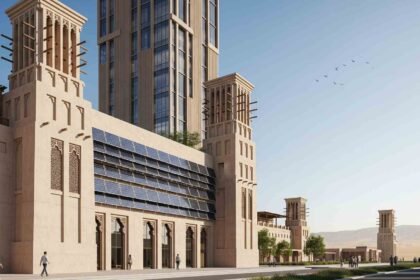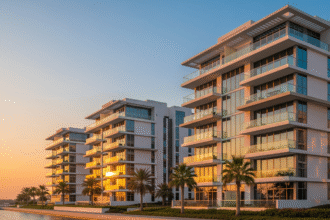Dubai has introduced a groundbreaking new law to regulate its contracting sector, aiming to enhance transparency, oversight, and accountability while aligning the industry with the emirate’s ambitious development goals. Issued by His Highness Sheikh Mohammed bin Rashid Al Maktoum, Vice President and Prime Minister of the UAE and Ruler of Dubai, Law No. 7 of 2025 introduces a unified framework for classifying contractors based on their technical expertise and operational capacities. The law also imposes strict penalties, including fines of up to AED200,000 for violations, signaling a significant overhaul of the sector.
A Unified Framework for Growth and Compliance
The new law addresses the rapid growth of Dubai’s construction sector, which has seen numerous large-scale projects in recent years. However, this expansion has also highlighted the need for better regulation to ensure quality, safety, and compliance. The legislation introduces a unified regulatory framework that covers contractor classification, oversight, transparency, and accountability, ensuring that contractors operate within their approved technical and financial limits.
Key features of the law include:
- Contractor Classification: Contractors will be categorized based on their expertise and capacity, ensuring they only undertake projects they are qualified for.
- Centralized Registry: Dubai Municipality will establish and manage an integrated electronic system for all contracting activities, linked to the ‘Invest in Dubai’ platform. This system will serve as a central registry for contractors, streamlining access to information and services.
- Code of Conduct: Dubai Municipality will prepare a code of conduct for the sector and issue professional competency certificates to technical personnel, ensuring a skilled and ethical workforce.
- Regulatory Oversight: A new body, the Contracting Activities Regulation and Development Committee, will be established to oversee the law’s implementation. Chaired by a Dubai Municipality representative, the committee will include members from various government entities and will be responsible for approving contracting activities, resolving disputes, and coordinating with stakeholders.
Strict Penalties to Ensure Compliance
To enforce the new regulations, the law introduces stringent penalties for violations. Fines range from AED1,000 to AED100,000 for first-time offenses, with repeat violations within a year potentially doubling the fines up to a maximum of AED200,000. Additional penalties include:
| Violation | Penalty |
| First-time offense | Fines from AED1,000 to AED100,000 |
| Repeat offense within one year | Fines doubled, up to AED200,000 |
| Non-compliance with classification | Suspension from contracting activities for up to one year |
| Unauthorized subcontracting | Downgrading of contractor classification |
| Serious violations | Removal from the official contractor registry, cancellation of licenses |
| Technical staff violations | Suspension or deregistration, revocation of professional certificates |
These measures underscore the government’s commitment to maintaining high standards in the contracting sector and ensuring that only qualified and compliant contractors operate in Dubai.
Transition Period for Existing Contractors
Recognizing the need for a smooth transition, the law provides one year for existing contractors to regularize their status following the new regulations. This period may be extended by the committee for an additional year if necessary. Contractors whose registrations are set to expire during this time can renew their licenses by declaring their intent to comply within the designated timeframe.
Scope and Exemptions
The law applies to all contractors operating in Dubai, including those in special development zones and free zones such as the Dubai International Financial Centre. However, it explicitly excludes contracting activities related to airports and associated infrastructure, as well as any other activities exempted by a decision from the Chairman of the Executive Council of Dubai based on the committee’s recommendations.
Effective Date and Long-Term Vision
The law will take effect six months after its publication in the Official Gazette, providing time for contractors and authorities to prepare for the changes. By aligning the contracting sector with Dubai’s building codes, planning regulations, and long-term development strategy, the law is expected to support sustainable growth and enhance the emirate’s reputation as a global hub for construction and development.
Implications for the Industry
This new law is poised to bring significant changes to Dubai’s contracting sector. By standardizing contractor classification and enforcing stricter compliance measures, it aims to raise the overall quality of construction work and ensure that only qualified contractors are engaged in projects. The introduction of an electronic registry and professional competency certificates will also help maintain a database of qualified professionals, benefiting both contractors and clients.
While the law’s stringent penalties demonstrate the government’s commitment to enforcing compliance, some industry stakeholders may face challenges during the initial adjustment period. However, the one-year regularization period should provide sufficient time for contractors to adapt, provided clear guidelines and support are offered by the authorities.
A Step Towards a More Transparent and Accountable Sector
Dubai’s new contracting law reflects the emirate’s broader vision for sustainable development and its commitment to maintaining high standards in its construction industry. By enhancing transparency, improving coordination among authorities, and ensuring accountability, the law is expected to streamline processes, reduce bureaucratic hurdles, and foster a more disciplined and professional contracting sector.
As Dubai continues to grow as a global business and tourism hub, this legislative overhaul ensures that its infrastructure development keeps pace with its ambitious goals, while safeguarding the interests of all stakeholders.







